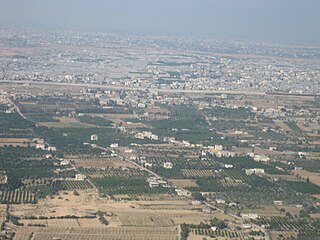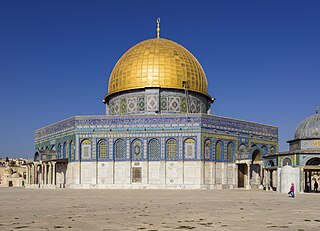
The Gaza Strip, or simply Gaza, is a small, densely populated territory located on the eastern coast of the Mediterranean Sea. It is the smaller of the two Palestinian territories. Gaza is bordered by Egypt on the southwest and Israel on the east and north.

The Israeli–Palestinian conflict is an ongoing military and political conflict about land and self-determination within the territory of the former Mandatory Palestine. Key aspects of the conflict include the Israeli occupation of the West Bank and Gaza Strip, the status of Jerusalem, Israeli settlements, borders, security, water rights, the permit regime, Palestinian freedom of movement, and the Palestinian right of return.

The Palestinian territories, also known as the Occupied Palestinian Territory, consist of the West Bank and the Gaza Strip—two regions of the former British Mandate for Palestine that have been occupied by Israel since the Six-Day War of 1967.

Palestine, officially the State of Palestine, is a country in the southern Levant region of West Asia. It encompasses two disconnected territories – the West Bank and the Gaza Strip, collectively known as the Palestinian territories – within the larger region of Palestine. The country shares its borders with Israel to north, west and south, Jordan to the east and Egypt to the southwest. It has a combined land area of 6,020 square kilometres (2,320 sq mi) while its population exceeds five million people. Its proclaimed capital is Jerusalem while Ramallah serves as its administrative center and Gaza City was its largest city until massive evacuations began in 2023 due to the Israeli invasion of the Gaza Strip. Arabic is the official language. The majority of Palestinians practice Islam while Christianity also has a presence.
Abdel Aziz al-Rantisi was a Palestinian political leader and co-founder of Hamas, along with Sheikh Ahmed Yassin.

Rafah is a Palestinian city in the southern Gaza Strip. It is the capital of the Rafah Governorate of the State of Palestine, located 30 kilometers (19 mi) south-west of Gaza City. In 2017, Rafah had a population of 171,889. As a result of massive bombardment and ground assaults in Gaza City and Khan Yunis by Israel during the Israel–Hamas war, about 1.4 million Palestinians are believed to be sheltering in Rafah as of February 2024.

The state of human rights in the West Bank and Gaza Strip is determined by Palestinian as well as Israeli policies, which affect Palestinians in the occupied Palestinian territories both directly and indirectly, through their influence over the Palestinian Authority (PA). Based on The Economist Democracy Index this state is classified as an authoritarian regime.

The 2006 Gaza–Israel conflict, known in Israel as Operation Summer Rains, was a series of battles between Palestinian militants and the Israel Defense Forces (IDF) during summer 2006, prompted by the capture of Israeli soldier Gilad Shalit by Palestinian militants on 25 June 2006. Large-scale conventional warfare occurred in the Gaza Strip, starting on 28 June 2006, which was the first major ground operation in the Gaza Strip since Israel's unilateral disengagement plan was implemented between August and September 2005.

Bureij is a Palestinian refugee camp located in the central Gaza Strip east of the Salah al-Din Road in the Deir al-Balah Governorate. The camp's total land area is 529 dunums and in 2017, it had a population of 28,024 with 28,770 registered refugees. The Palestinian Central Bureau of Statistics (PCBS) 2017 census listed a population of 15,491 in the surrounding Bureij municipality apart from the camp population.
The Gaza–Israel conflict is a localized part of the Israeli–Palestinian conflict beginning in 1948, when 200,000 Palestinians fled or were expelled from their homes, settling in the Gaza Strip as refugees. Since then, Israel has fought 15 wars against the Gaza Strip. The number of Gazans reportedly killed in the most recent 2023-2024 war — 37,000 — is higher than the death toll of all other wars of the Arab-Israeli conflict.
Palestinian land laws dictate how Palestinians are to handle their ownership of land under the Palestinian National Authority—currently only in the West Bank. Most notably, these laws prohibit Palestinians from selling any Palestinian-owned lands to "any man or judicial body corporation of Israeli citizenship, living in Israel or acting on its behalf". These land laws were originally enacted during the Jordanian occupation of the West Bank, which began after Jordan's partial victory during the 1948 Arab–Israeli War and ended after the sweeping defeat of the Arab coalition to the Israeli military during the 1967 Arab–Israeli War, following which the territory was occupied by Israel. Land sales by Palestinians to Israelis are considered treasonous by the former to the Palestinian national cause because they threaten the aspiration for an independent Palestinian state. The prohibition on land-selling to Israelis in these laws is also stated as enforced in order to "halt the spread of moral, political and security corruption". Consequently, Palestinians who sell land to Israelis can be sentenced to death under Palestinian governance, although death penalties are seldom carried out; capital punishment has to be approved by the President of the Palestinian National Authority.

An increase of violence occurred in the Israeli–Palestinian conflict starting in the autumn of 2015 and lasting into the first half of 2016. It was called the "Intifada of the Individuals" by Israeli sources, the Knife Intifada, Stabbing Intifada or Jerusalem Intifada by international sources because of the many stabbings in Jerusalem, or Habba by Palestinian sources. 38 Israelis and 235 Palestinians were killed in the violence. 558 Israelis and thousands of Palestinians were injured.

Capital punishment in the Gaza Strip has been enforced by multiple governments, militaries, and irregular militias throughout the area's history. A large proportion of the killings have been associated with broader violent conflicts. Many of the executions have been described by some as extrajudicial killings for an incomplete or unrecorded court procedure.
Ras Sedr massacre was a mass murder of at least 52 Egyptian prisoners of war that took place immediately after a paratrooper unit of the Israel Defense Forces conquered Ras Sedr in the Sinai Peninsula on 8 June 1967 during the Six-Day War.

Crime in the State of Palestine is present in various forms which include theft, drug trafficking, arms trafficking, burglary, human trafficking and terrorism.
There is no page for Capital punishment in the State of Palestine, some aspects of the topic are covered on:

There have been numerous targeted killings, summary executions, and other extrajudicial killings in the Gaza Strip and surrounding areas. A small number of people in the Gaza Strip have been sentenced to death after murder convictions in civilian courts, but far more executions have been implemented by military courts with limited accountability, and many have been comletely extrajudicial killings or summary executions. Most of these killings have been during broader violent conflicts, but the people killed were unarmed and not actively engaged in combat at the time. The violence has repeatedly spoiled over into the Gaza Envelope and the Sinai Peninsula.








